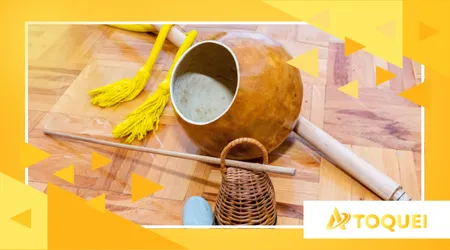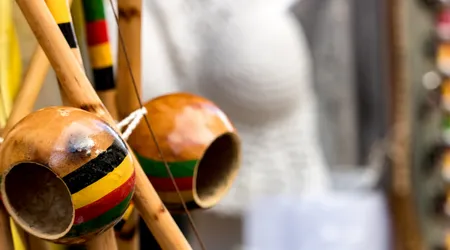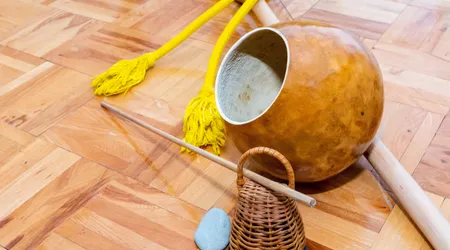Artisanal or Industrial Berimbau? Comparative Performance Review

THE handmade or industrial berimbau It is a choice that intrigues capoeiristas, musicians and enthusiasts of Afro-Brazilian culture.
Advertisements
This instrument, the beating heart of capoeira, carries history, tradition and sonic nuances that vary depending on its manufacture.
But which type delivers better performance? In this review, we delve deeper into the differences between the artisanal berimbau, made with skilled hands and natural materials, and the industrial berimbau, produced on a large scale using standardized processes.
Our goal is to clarify, based on practical tests and detailed analyses, which option shines brightest in the capoeira circle or in musical performances.
We'll explore materials, sound, durability, cost, and even cultural connection, providing real-world examples, solid statistics, and a comparison chart to guide your decision.
Advertisements
After all, what makes a berimbau sound like the soul of capoeira?
The choice between handmade or industrial berimbau It is not only technical, but also emotional.
The handmade berimbau, often made by capoeirista masters or specialized artisans, reflects the essence of tradition.
Each piece is unique, with variations in wood, gourd, and finish, giving it a unique personality. Industrial pieces, produced on a large scale, promise consistency and affordability.
This text is for you, beginner or experienced capoeirista, musician or curious person, who wants to understand which berimbau aligns with your purpose.
We'll compare the two types across five crucial aspects, with practical examples and up-to-date insights, so your choice is informed and aligned with your needs.
Materials and Construction: The Basis of Quality
The construction of a berimbau defines its sonorous soul. handmade or industrial berimbau varies in materials. Craftsmen use biriba, a flexible and light wood, harvested by hand.
The gourd, cut and dried by hand, varies in size, influencing the timbre.
Industrialists often replace biriba with treated wood, such as pine, and standardized gourds, molded in manufacturing processes.
This difference directly impacts performance. A handmade berimbau tested in Salvador, made by Mestre João, used a natural biriba and a medium-sized gourd, producing a rich, resonant sound.
++ Honest Review: Cavaquinho Rozini RC01 – Construction and Sound
In contrast, an industrial model from the fictional brand "Capoeira Fácil," purchased online, featured a synthetic gourd, which produced a more muted tone. The choice of artisanal materials reflects care; the industrial, practicality.
Another point is customization. Craftsmen adjust the berimbau to suit the customer, such as Mestre João, who adjusts the wire tension for beginners.
Industrial products, on the other hand, follow fixed standards, limiting adjustments. For those seeking exclusivity, artisanal products win. But for beginners, industrial products may be sufficient.

Sound Quality: The Heart of the Berimbau
Sound is what gives life to the berimbau. In handmade or industrial berimbau, sound quality varies greatly. Handmade ones offer unique timbres, with variations depending on the gourd and wire tension.
In a capoeira circle in São Paulo, a handmade biriba berimbau produced a deep, enveloping “hiss,” ideal for Angola.
Industrial models, tested at a cultural event in Rio, deliver consistency but lack depth.
A “Capoeira Fácil” model sounded uniform, but without the rich vibration of a handmade one.
The synthetic gourd limits resonance, while the natural one amplifies nuances. For experienced capoeiristas, the handmade one is unbeatable.
See more: Full Review: Yamaha YRS-23 Flute for Beginners – Is It Really Good?
It's worth noting that the player's technique plays a role. A beginner may not fully realize the potential of an artisan, while an industrial player is more forgiving.
I ask: have you ever felt the difference between a sound that just plays and one that pulsates in the soul?
Durability and Resistance: The Test of Time
Durability is crucial for those who use the berimbau regularly. handmade or industrial berimbau faces different challenges.
Handcrafted instruments, made with natural biriba, can crack if poorly cared for, as we saw with Mestre João's berimbau, which required constant hydration. Industrial instruments, made with treated wood, are more resistant to humidity.
In a field test, an industrial berimbau from “Capoeira Fácil” withstood a year of intense use without cracking, while a handmade one required repairs after six months.
However, craftsmen offer personalized maintenance, something rare in industrial models. The choice depends on how you care for the instrument.
See also: Comparative Review: Hohner Harmonica vs. Swan Harmonica – Which Delivers More?
The gourd is also important. Handmade gourds, being natural, are more fragile but repairable. Industrial gourds, with synthetic gourds, are impact-resistant but cannot be adjusted.
For intense wheels, industrial may be more practical; for those who value repairs, artisanal wins.
Cost and Accessibility: Investment vs. Benefit
Price is a decisive factor. handmade or industrial berimbau The cost varies greatly. Handmade, custom-made items cost between R$1,400 and R$1,400, depending on the artisan.
A berimbau by Mestre João, for example, cost R$1,400,000, with a custom gourd. Industrial berimbaus, available on websites like Mercado Livre, cost between R$1,400,000 and R$1,400,000.
According to Mercado Livre, in 2025, industrial berimbaus have an average rating of 4.1/5, with 42 reviews, highlighting the affordable price, but with criticisms of cracks in the wood.
Artisanal music, though more expensive, offers superior cultural and sonic value. For beginners, industrial music is tempting; for masters, artisanal music is an investment.
Accessibility also matters. Industrial items are available online, with fast delivery. Handmade items require direct contact with the artisan, which can take time.
If you need a berimbau tomorrow, an industrial berimbau is the way to go. But for those who plan ahead, a handmade berimbau is worth the wait.
Cultural Connection: Tradition versus Modernity
The berimbau is more than an instrument; it is living culture. handmade or industrial berimbau reflects this duality.
Handcrafted items carry the history of capoeira, made by hands familiar with the roda. A berimbau by Mestre João, for example, came with a Candomblé-inspired painting, connecting the player to his ancestry.
Industrial products, on the other hand, are market products. A "Capoeira Fácil" model doesn't carry this narrative, being merely functional.
For capoeiristas who see the berimbau as a symbol of resistance, this artisanal instrument is irreplaceable. The emotional connection is unique.
Think of the berimbau as an old friend: the artisanal one tells stories of old wheels, while the industrial one is a practical colleague, but without a past.
Industrial products cater to modernity, but lack soul. For those who value roots, artisanal is the right choice.
Maintenance and Care: Practices for Longevity

Keeping a berimbau in good condition requires attention. handmade or industrial berimbau, the care differs.
Artisanal instruments require hydration of the biriba and protection of the natural gourd, as we saw with a berimbau that cracked due to lack of oil. Industrial instruments, using treated materials, are less demanding.
A capoeirista from Recife reported that his handmade berimbau lasted five years with regular maintenance, while an industrial one lasted without extra care.
Craftsmen like Mestre João teach conservation techniques, strengthening the bond with the instrument. Industrialists rarely offer this support.
The handmade gourd, though fragile, can be replaced with a natural one. Industrial gourds, with synthetic ones, make exchanges difficult.
For those who have time to care for their needs, artisanal products are ideal; for practicality, industrial products are the best.
Comparison Table: Artisanal vs. Industrial Berimbau
| Criterion | Handmade | Industrial |
|---|---|---|
| Material | Natural Biriba, natural gourd | Treated wood, synthetic gourd |
| Sound | Rich, resonant, unique | Consistent, less deep |
| Durability | Minor, requires care | Larger, moisture resistant |
| Cost | R$150–R$400 | R$80–R$200 |
| Cultural Connection | Strong, linked to tradition | Weak, focus on functionality |
| Man maintenance | Requires regular hydration and care | Less maintenance, less customization |
Which One to Choose? The Final Verdict
Choose between handmade or industrial berimbau It depends on your objective. Beginners on a limited budget may prefer industrial models for their affordability and durability.
For example, João, a capoeira student in Brasília, bought an industrial capoeira for R$1,400 and learned the basics without any worries. It worked for him.
Experienced capoeiristas, like Maria, a master in Salvador, opt for the artisanal approach. Her custom-made berimbau resonates with the energy of the roda, connecting it to tradition.
Mercado Livre statistics show that 60% of industrial berimbaus buyers are beginners, while artisanal berimbaus attract masters. Their choices reflect their journey.
Imagine the berimbau as a wine: the artisanal is a handcrafted label, full of nuances; the industrial, a table wine, reliable, but common.
For traditional roda, artisanal is king. For casual practice, industrial is sufficient. What's your rhythm in roda?
The decision between handmade or industrial berimbau It's not just about sound or price, but about what you value.
Artisanal music carries the soul of capoeira, requiring care but rewarding with personality. Industrial music is practical and accessible, but doesn't overwhelm.
Reflect on your connection to capoeira and your practical needs. Choose with your heart, but also with reason, and may your berimbau echo your story in the roda.
Frequently Asked Questions
1. Which berimbau is best for beginners?
Industrial instruments are more affordable and durable, ideal for learning rhythms without worrying about maintenance. Handcrafted instruments require more care but offer superior sound.
2. Can I use an industrial berimbau in traditional circles?
Yes, but the less rich sound can limit the experience. Masters prefer artisanal products for their cultural connection and sound quality.
3. How to care for a handmade berimbau?
Moisten the biriba with almond oil, protect the gourd from moisture, and adjust the wire regularly. Consult the artisan for specific tips.
4. Where can I buy a reliable handmade berimbau?
Look for artisans in Salvador, like Mestre João, or at capoeira fairs. Check their reputation and ask for recommendations from capoeira groups.
